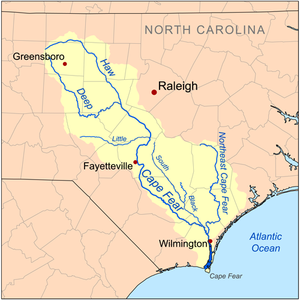Deep River (North Carolina)
This article needs additional citations for verification. (January 2009) |
| Deep River Tributary to Cape Fear River | |
|---|---|
 The Deep River in Franklinville, North Carolina | |
 Map of the Cape Fear drainage basin showing Deep River | |
| Location | |
| Country | United States |
| State | North Carolina |
| Counties | Chatham Guilford Moore Randolph |
| Physical characteristics | |
| Source | confluence of West and East Fork of Deep River |
| • location | High Point, North Carolina[1] |
| • coordinates | 35°59′44″N 079°56′44″W / 35.99556°N 79.94556°W[2] |
| • elevation | 757 ft (231 m) |
| Mouth | Cape Fear River |
• location | Moncure, North Carolina[1] |
• coordinates | 35°35′48″N 079°03′11″W / 35.59667°N 79.05306°W[2] |
• elevation | 160 ft (49 m) |
| Length | 112.97 mi (181.81 km)[3] |
| Basin size | 1,450.17 square miles (3,755.9 km2) |
| Discharge | |
| • location | Cape Fear River |
| • average | 1,525.72 cu ft/s (43.204 m3/s) at mouth with Cape Fear River[4] |
| Basin features | |
| Progression | southeast |
| River system | Cape Fear River |
| Tributaries | |
| • left | East Fork of Deep River Bull Run Hickory Creek Polecat Creek Bush Creek Sandy Creek Reed Creek Millstone Crek Broad Mouth Branch Back Branch Brush Creek Flat Creek Cedar Creek Georges Creek Rocky River Rocky Branch |
| • right | West Fork Deep River Copper Branch Richland Creek Muddy Creek Hasketts Creek Gabriels Creek Mill Creek Richland Creek Fork Creek Grassy Creek Bear Creek Buffalo Creek Scotchman Creek Lick Creek McLendons Creek Crawley Creek Smiths Creek Pocket Creek Patterson Creek Big Buffalo Creek Little Buffalo Creek |
| Waterbodies | High Point Lake |
Deep River is a tributary of the Cape Fear River, approximately 125 miles (200 km) long, in north central North Carolina in the United States. Deep River is a translation of the Indian name sapponah, "deep river".[5]
Paddling is popular on the river. Deep River is flanked by the planned Deep River State Trail and several other parks and preservation areas including Carbonton Dam Park, House in the Horseshoe Historic Site, Deep River Park and Deep River Camelback Truss Bridge, Endor Iron Furnace, White Pines Nature Preserve, Lockville Dam, Canal and Powerhouse, and Mermaid Point.[6]
The Cape Fear shiner, a critically endangered minnow, inhabits the river.
Course
Deep River rises in the Piedmont country in western Guilford County, east of Kernersville. It flows southeast past High Point and Randleman, forming the Randleman Lake. It passes northeast of Asheboro, then flows east to Franklinville then to Ramseur, then passing north of Sanford. The Rocky River enters the Deep River at the White Pines Nature Preserve.[7] Deep River joins Haw River at Mermaid Point near Haywood, just below the Haw's emergence from Jordan Lake, to form the Cape Fear River.
Dams
Deep River has 12 dams or relict dam structures and is the source river of the Randleman lake project that covers 3000 acres (12 km²) of property on the river near U.S. Route 220. The river crosses the Fall Line of North Carolina, an area where rivers are quite rocky and have a moderately high gradient. This gradient was used to power mills along the river to support the early textile industry in North Carolina. The river, popular with canoeists, was a center of a great deal of activity during the American Revolution at places such as Franklinville and the House In The Horseshoe.
The Lockville Dam, built of stone, is the only portion of the 19th-century Deep River lock and dam system that remains today.[6]
Until recently, the Deep River was host to the Carbonton Dam, the largest dam on the river at 17 feet (5.2 m) high and 270 feet (82 m) wide. In the fall of 2005, the dam was removed for the purpose of creating environmental mitigation credit by Restoration Systems, LLC, a leading environmental mitigation company in North Carolina. The project restored 10 miles (16 km) of the former impoundment around the House in the Horseshoe to free-flowing river.
References
- ^ a b "Deep River Topo Map, Chatham County NC (Moncure Area)". TopoZone. Locality, LLC. Retrieved 25 July 2019.
- ^ a b "GNIS Detail - Deep River". geonames.usgs.gov. US Geological Survey. Retrieved 25 July 2019.
- ^ "ArcGIS Web Application". epa.maps.arcgis.com. US EPA. Retrieved 25 July 2019.
- ^ "Deep River Watershed Report". Waters Geoviewer. US EPA. Retrieved 25 July 2019.
- ^ Gannett, Henry (1905). The Origin of Certain Place Names in the United States. Govt. Print. Off. pp. 102.
- ^ a b "Deep River Paddling Guide" (PDF). Archived from the original (PDF) on 2014-10-12. Retrieved 2013-04-07.
- ^ Welcome to the Rocky River:The River Chatham County Can Call It's Own![permanent dead link]
